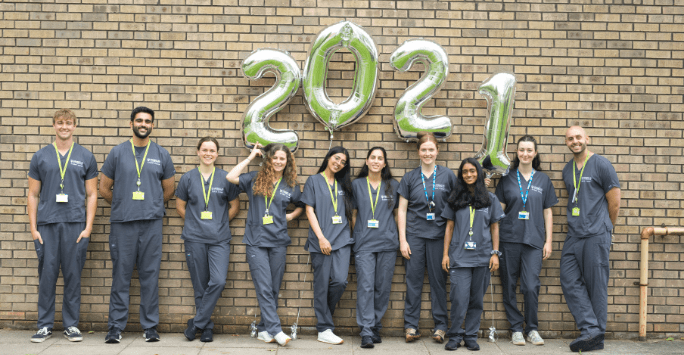
The Class of 2021 turned out in force to complete the National Student Survey earlier this year and share insights on their student experience.
The School of Medicine was delighted that they recorded an overall satisfaction score of 87% in the NSS, placing the School a step higher in the national list of top medical schools, fifth within the Russell Group, and helping it climb the Times Higher Education and Guardian leader boards.
Areas such as teaching, academic support, student voice and being part of a learning community scored particularly high, with a 91% rating for teaching on the MBChB programme and 94% feeling they had had the right opportunities to provide feedback on the course. ’
Graduating student doctors also took the time to leave many messages of appreciation and thanks in the qualitative section of the survey, highlighting the aspects of the programme that meant the most to them – from training in Communication and Clinical Skills, to the hands-on learning experiences on clinical placement, and support from Academic Advisors, Wellbeing Team and leadership.
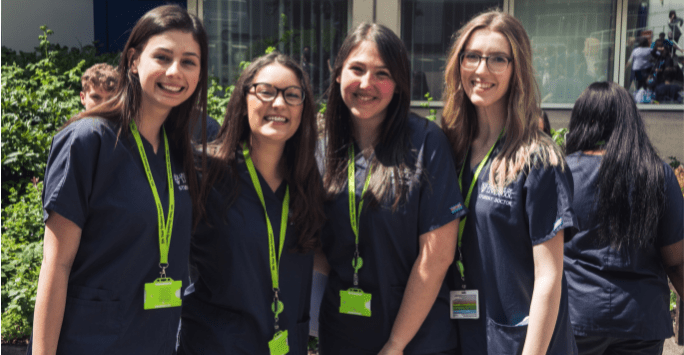 Graduating student doctors outside Royal Liverpool University Hospital
Graduating student doctors outside Royal Liverpool University Hospital
Students praised the right balance of lectures, seminars and small group teaching sessions to support their learning. Communication for Clinical Practice (CCP) is one of the School’s flagship learning focuses and was credited in the NSS with providing students with an advantage on placement and preparing them to build good relationships with patients.
Professor Bridget Young, Academic Director for CCP, says, “We’re absolutely delighted to hear from our student doctors about how much they value the communication teaching. The CCP team, tutors and simulated patients have worked especially hard over the last 18 months to make the online sessions a good learning experience."
The Year 5 student doctors have played a big part in making CCP a success, adapting brilliantly to online learning and engaging enthusiastically with the sessions. A fantastic example of teamwork!
Similarly, Community Clinical Teaching (CCT) was mentioned as a particular highlight. Community Clinical Tutor Lead Dr Helen Rawsthorne says, "As a team of 40 practising GPs, we have a passion to share our love of medicine with student doctors from a primary care perspective. The sessions thrive on interactive discussion around cases seen in practice by students and on topics relevant to the clinical placement the students are about to undertake, whether that is in general practice or secondary care. CCT is a fundamental part of the School of Medicine curriculum and continues to develop in response to our students. The NSS comments are encouraging and welcome."
Our Student Doctors love to get practical, and both their sessions at Clinical Skills and the Human Anatomy Resource Centre (HARC) were praised as being incredibly useful and by one student as some of their favourite memories from studying medicine.
Deputy Director of Clinical Skills Cathy Carr shares, “The team works exceptionally hard to create engaging, evidence-based resources to accompany the interactive practical teaching sessions that we deliver. We are extremely proud of our work, and this is especially true when we see the impact that it has had on our graduating students."
We know that we are in a privileged position of delivering not only an essential part of the curriculum, but an extremely enjoyable element.
"We are so pleased to hear that the students reflect this with their feedback, which shows what a longstanding relationship we endeavour to create with our students right through from year 1 to graduation and beyond.”
Deputy Director of HARC Dr Alistair Bond says, “It is great to hear that the students value our teaching. All the lecturers, demonstrators and technicians have worked tirelessly over many years to ensure we provide the best possible experience for the students, and this was no more truer than during the COVID-19 pandemic. As a team we listened and responded to feedback as quickly as possible, and we will continue to do so as we move cautiously forward. Knowing the impact it has made to the students keeps us all motivated!”
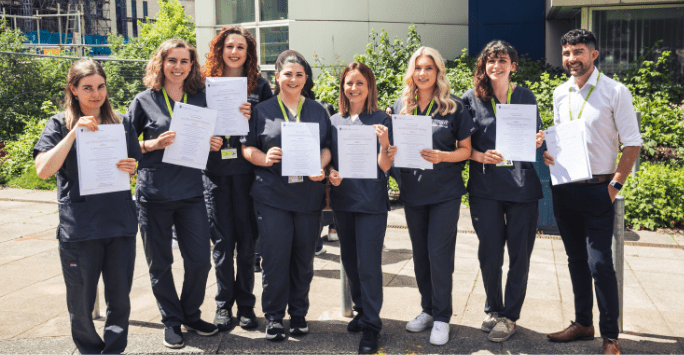 Students pose with their Declaration of Geneva certificates
Students pose with their Declaration of Geneva certificates
It comes as no surprise that access to such a wide range of clinical placements stood out as one of the aspects most appreciated by graduating students with 97% saying they had opportunities to apply what they had learnt – much of this on placement. Students highlighted the commitment, availability and support of educational supervisors across the School’s network of NHS Trusts and GP practices in the comments.
Countess of Chester Hospital was particularly commended for going above and beyond for ensuring students are looked after both pastorally and professionally.
Clinical Sub-Dean Nicola Eardley says, “The Countess of Chester medical education team were delighted with such lovely feedback!"
They always put the students’ wellbeing and education at the heart of everything they do.
"The past 18 months or so have been particularly challenging due to the evolving nature and effects of the pandemic on the delivery of medical education and so it is heartening to see that their hard work and care has been appreciated by the students.”
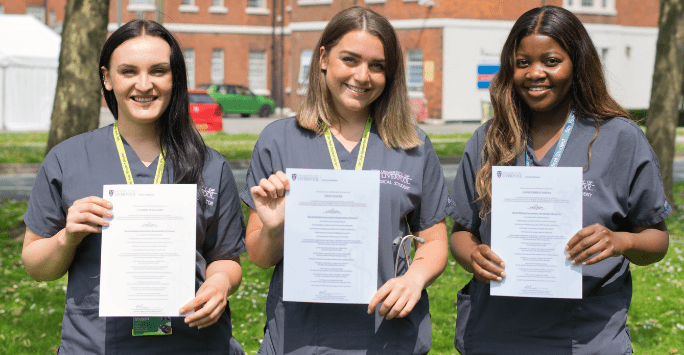
Student doctors take the Declaration of Geneva at a ceremony at Countess of Chester Hospital
The School's Wellbeing support featured prominently in the feedback, with students acknowledging the tailored and high-quality support provided by the team of Wellbeing professionals.
Director of MBChB Wellbeing Service Alison Threlfall shares, "We were really thrilled to see the comments made by our year five students about the Wellbeing Team’s work. The Team are committed to providing student doctors excellent support with our personalised service - it’s great to hear that we are appreciated."
The graduating students were also quick to offer their thanks to the Year 5 Team, who they said had offered fantastic support and organisation throughout their final year.
Year 5 Director Dr Rachel Wallis says, “We are delighted to hear that students have appreciated the hard work of the team and engaged with us to make the year a success."
It’s an absolute privilege to support our wonderful students to develop into the professional, enthusiastic and inspirational doctors they have become.
Assessment was also an area that gained appreciation from students who acknowledged how these were adjusted and shaped to accommodate challenges presented by COVID-19.
Director of Assessment and Feedback Bee Collier says, “I was very happy to see positive comments from our students, especially as assessment schedules and formats had to adapt, giving our students the assessments that were needed for them to demonstrate their ability. They were all amazing!”
This year’s survey also provided useful insights that have helped form action points already underway this academic year. For example, the creation of further assessment guidance and documentation, including marking criteria, to support students in this area.
Bee Collier says, “I hope that the changes and additions to assessment and feedback will continue to help our students demonstrate that they have the knowledge and skills required to be excellent foundation doctors as they graduate.”
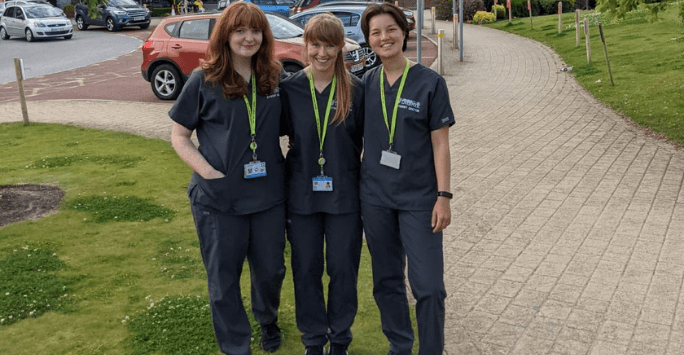 Final year student doctors celebrate the end of term at Whiston Hospital
Final year student doctors celebrate the end of term at Whiston Hospital
Additionally, while the value placed on student input at the School clearly shone through, with 94% of students saying they had opportunities to provide feedback, an action point emerged around making the actionability of this more visible. This has guided the decision to more regularly sharing implementations linked to student feedback throughout the year.
Evaluation Data Analyst Suzie Wood shares, "When students complete evaluation surveys it provides one of the ways in which we can find out about the quality of undergraduate medical education. Our work in the Quality team is to analyse and interpret feedback data and provide reports to educational leads and teams so that action plans can be developed. By adapting our approach to how this is shared with students, we hope to make their part in this process even more obvious."
By listening to what students say we can be sure that we are delivering responsive and flexible education.
Dr Viktoria Goddard, Vice Dean of Learning and Scholarship at the School, was heartened by this year’s results.
“I am delighted that the changes made to the programme, school and organisation are valued by our graduating cohort."
It gives me an enormous amount of personal satisfaction to see our student doctors progress through their training and graduate to take their first jobs as FY1s.
"It's wonderful to hear that so many of them are proud to have graduated from Liverpool and that they've had an overwhelmingly positive experience as student doctors through the MBChB programme.”
Dean of Liverpool School of Medicine Professor Hazel Scott was equally thrilled with the results, and most importantly that so many students took the opportunity to share their thoughts on their time with us,
“Staff at the School and I are always seeking to build on what we offer to students, from new enhancements to the course, to our “Liverpool” experience. We welcome comments that have highlighted things to work on, and activities are underway in respect of several of these."
But in this particularly challenging year, it has been especially meaningful to staff to have so many comments of student encouragement, noting positive results from earlier changes and the high level of staff commitment.
"I really appreciate the number of students who took part in the survey and who took time to make additional comments."
One student comment says simply, “Overall, I believe the course has prepared me well to become the best foundation doctor that I can be.” And I think we can all agree that is exactly what we should be aspiring to as a School of Medicine.
The National Student Survey runs annually and is open to final year students across the UK. See the NSS website (link) for more information on this year’s results.